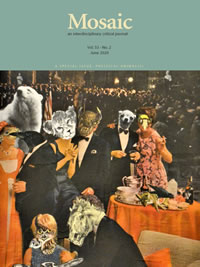Issue 53.2
Overview

Special Issue: Political Animal(s)
Published: June 2020
View the issue introduction or see the issue summary and contents below.
12 essays, totalling 192 pages
$24.95 CAD
This special issue, guest edited by Nicole Anderson and H. Peter Steeves, brings together eleven essays and an introduction that examine “the many resonances at work in the notion of a ‘political animal’” (Anderson and Steeves 2).
Political Animal(s)Nicole Anderson and H. Peter Steeves Introducing Mosaic’s June 2020 special issue, Political Animal(s), Nicole Anderson and H. Peter Steeves examine notions of the “political” animal. | |
Clothes Make the Man: Plato on the Origins of Politics, the Arts, and PhilosophyMichael Naas In this essay I demonstrate that the theme or trope of clothing is, in Plato, not just some rhetorical embellishment of the dialogues but an essential element in Plato’s understanding of the relationship between the human, who is in need of the supplement of clothing, and the animal, who is not. | |
Sons and Daughters of the Bear Mother: On Humanimal CultureJason Wirth This essay investigates the ambiguous relationship between humans and bears, especially in light of the catastrophic fate of the latter in the Anthropocene. Their demise correlates to the loss of any cultural, political, and economic sense of our kinship with them. The consequences of this growing ontological gap include the ongoing extinction of “humanimal culture.” | |
How the King of Beasts Became a Republican: A Lion in the French RevolutionJohn Simons This essay examines the way in which the lion who lived first at Versailles and then in Le Jardin des Plantes in Paris was depicted in a range of texts. It shows how the lion was central to debates about science, Revolution, and the function of zoos. | |
PropolisH. Peter Steeves Honeybees, it has been argued, live in democratic colonies. This essay proposes six theses concerning honeybee politics, arguing that a thoughtful investigation of honeybee communication, anarchic decision-making, and conceptions of community challenge us to embrace a radical reconceptualization, and perhaps rejection, of “the political” in general. | |
TelegramsLynn Turner “Telegrams” attends to the persistent problems that lie in the theoretical severance of voice from speech. While scholars such as Dolar attempt to anchor psychoanalysis as the field best placed to account for this distinction, “Telegrams” invites you to return to Derrida, to Cixous, and to the more-than-human poetics of deconstruction. | |
Animal Activists and the Possibility of ResponseJennifer O. Gammage Animalistic rhetoric is often used to discredit and criminalize political activists. While such dehumanization is embedded within a history of racially-motivated oppression and certainly calls for a reassertion of humanity, I ultimately argue that viewing animals as apolitical forecloses rich possibilities for political resistance. | |
Only an Animal Can Save UsClaire Colebrook One of the many ways in which the difference between humans and animals has been theorized is by way of point of view. We may amass any amount of knowledge about a creature and yet never come close to experiencing their world. Rather than questioning this distinction between human and animal, I argue that it applies to relations among humans. | |
Humanimal PoliticsNicole Anderson This essay takes both a theoretical and autoethnographic approach: utilizing Levinas and Derrida alongside the true story of my singular relationship with a wild animal, this essay attempts to demonstrate not only the multiplicity of differences between human and nonhuman animals more generally, but specifically and by way of example, the contextual politics developed in and through a singular animal and human relationship. | |
The New Wild West: Risk, Viral Politics, and the Emergence of EpigeneticsJami Weinstein This paper argues that taking an historical perspective on perceived risks to bodies—be they guns, bedbugs, or viruses—exposes shifts in our understanding of both corporeal and vital ontologies, especially the extent to which it is considered bounded or porous and the effect that has on a body’s relationship to its milieu. Modes of political power implemented to respond to, or manage, these threats—from the managerial, microbiopolitical, or surveillance- and information-based control society forms to viral politics and emerging epigenetic theories—form a feedback loop that in turn remodulates both the logics of political response and the underlying ontologies. | |
Other Animals, Other Gardens: Animal Difference and Politics in Davidson, Derrida, and BadiouBill Martin This essay explores the question of “animality” and “human difference” as problems for politics and philosophy. If thought is the difference between human and non-human animals, and if, as Badiou argues, “politics is a thought,” does this mean that there is no “political dimension” to the human cohabitation of the earth with animals? Until we can conceive of a “common polity” among humans and other animals, there has to be a very careful consideration of strong borders that should not be crossed by humans. | |
Seduction and Pleasure in the Political OrderAlphonso Lingis Most gossip is keeping in touch with a wide constellation of people, and when we gossip about their foibles, it is to produce amusement, pleasure in their irrational actions. In the human political order, seduction, glamour, and display are determinative forces in producing cooperation and conflict. |